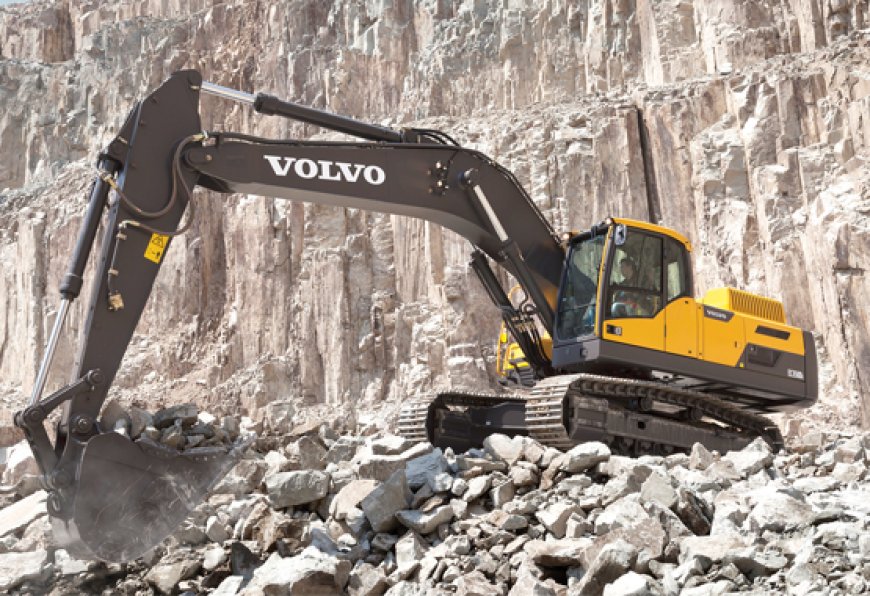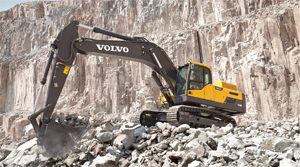Volvo CE believes that going electric is the future of our industry.
Dimitrov Krishnan Managing Director Volvo CE’s Volvo CE has a reputation for bringing the latest technologies and innovations to this industry, allowing customers to get better productivity, reliability and efficiency from their operations. How do you evaluate the conceptual shift


Dimitrov Krishnan
Managing Director
Volvo CE’s
Volvo CE has a reputation for bringing the latest technologies and innovations to this industry, allowing customers to get better productivity, reliability and efficiency from their operations.
How do you evaluate the conceptual shift from concepts like lift cycle cost and TCO towards ‘more productivity’?
We are confident that Volvo CE machines are among the best when it comes to Total Cost of Ownership. This is reinforced by the fact that India is home to some of the most sophisticated equipment buyers in the world, and our strong market position here reflects the levels of ROI we are able to bring to customers. Our superior fuel-efficiency, combined with high levels of productivity and excellent reliability all contribute to better profitability for owners.
 What are the challenges here as the shift seems to be market/customer driven, not OEM driven?
What are the challenges here as the shift seems to be market/customer driven, not OEM driven?
At Volvo CE, we have always been a customer-driven company, investing in research and development to manufacture products with customers’ feedback in mind. We offer high quality and productive equipment that delivers the best levels of fuel efficiency in the industry. Our customers can do more with their equipment and downtime is minimized. Our lower fuel consumption improves cost efficiency and means work environments are cleaner. Overall, our customers can enjoy high levels of return on investment and the reassurance of dealing with one of the world’s very best industrial companies.
An essential part of our customer support is our highly experienced dealer network, which covers the entire span of India. We are extremely proud of our dealer network partners and work hard to ensure we continuously develop to ensure this aspect of dealing with Volvo remains a key differentiator.
Brief us on the engine technology in-built in your latest range of excavators? Also tell us on the fuel saving features of the engine?
At Volvo CE, fuel efficiency is a major focus in our products. The EC200D, EC250D and the EC350D, for example, feature a highly efficient and powerful six-cylinder engine.
Where future technology is concerned, Volvo’s pursuit of electrically-driven vehicles could be a game changer. Recently, our company unveiled the world’s first fully-electric compact excavator, the EX2, which is equipped with electric drive systems and electromechanical linear actuators. While it is too early to say if there will eventually be a shift towards electric engines in the market, Volvo CE believes that going electric is the future of our industry. The EX2 prototype shows our determination to provide zero-emissions machines in the future which will have the same power and force as conventional equipment.
The EX2, however, is just one of a few electric initiatives we have. The LX1, while not fully electric like the EX2, is a prototype electric hybrid wheel loader. At a press event in the US in July this year, we presented results from hundreds of hours of testing that show an average improvement of 50% in fuel efficiency compared to its conventional counterparts. This equates to a reduction of 35% in fuel consumption and greenhouse gas emissions.
Thirdly, the HX1 is a prototype autonomous, battery-electric load carrier. It is one element of a project that aims to electrify a transport stage in a quarry – from excavation to primary crushing and transport to secondary crushing. It has already picked up industry awards for innovation.
Could you elaborate us on the design improvements to the hydraulic system that boost fuel efficiency?
Volvo CE is at the forefront of technological development and, each year, our parent company, the Volvo Group, invests billions of dollars in research and development to drive new innovations.
The newer models in our D-series excavators are equipped with G4 work modes that optimize fuel efficiency and performance. These work modes — Idle (I), Fine (F), General (G), Heavy (H) and Power max (P) — are integrated within the throttle control, so that operators can easily select the best one for the task at hand. In addition, an ECO mode automatically switches off the engine, further reducing fuel consumption.
What is the impact of telematics and data driven solutions in bringing down fuel consumption and enhancing productivity? Elaborate on the solutions offered in your range of excavators?
Volvo CE has a reputation for bringing the latest technologies and innovations to this industry, allowing customers to get better productivity, reliability and efficiency from their operations.
To give customers better insight into the performance of their construction equipment, we have developed CareTrack, a telematics system that gives owners access to a wide range of machine monitoring information to help save time and money. The system generates a multitude of reports, delivering data on aspects such as fuel consumption, operational hours, geographical location and more. The reports are available via a web portal or can be received via SMS or email alerts.
The system can also be used to manage machine servicing and the replacement of parts. This allows fleet managers to reduce fuel costs, optimize machine and operator performance, as well as proactively manage service and maintenance for maximum uptime.
Since there is a greater acceptance of ‘operator’ as a vital link in the whole system, correspondingly how the design trends have evolved, especially the cab design?
At Volvo, we know that when operators are comfortable they experience less fatigue and work more productively. That’s why the new, modern styling of the D-series cab provides superior visibility, a safe and spacious working environment and easy to access controls – right where you’d want them. Excavators from Volvo CE are versatile machines that can be applied to any number of duties. This ability to work in numerous applications requires skilful handling to ensure optimal performance. Of course, Volvo designs a range of technological aids, such as the Co-Pilot range of intelligent machine services – Load Assist, Dig Assist, Compact Assist and Pave Assist – to help operators deliver higher quality outcomes, in less time and with less effort. But ultimately, any excavator is only as good as the person in the cab, so it is essential that operators are well-trained in order to deliver the best possible performance. That includes having a comprehensive understanding of the relevance of Bucket Cut Depth, engine RPM and a host of other features.
At Volvo we run a large training operation in partnership with the GMR Varalakshmi Foundation, as part of an initiative to train and introduce new operators in the industry.
How do you assess the importance of ‘maintenance’ to fuel efficiency? What are the trends here?
Regular maintenance is important to support high machine uptime and fuel efficiency. We are seeing a trend of fleet operators using telematics like CareTrack to manage machine servicing and wear parts. This allows fleet managers to reduce fuel costs, optimize machine and operator performance, as well as proactively manage service and maintenance to maximize uptime.
What is special in ‘service packages’ that you offer to help enhance productivity, and continued uptime of a machine?
Customers say they like the insight CareTrack provides, which helps them enhance productivity, machine uptime and supports them with maintenance, invoicing, fleet management and operator training. With CareTrack, customers can monitor load efficiency, number of cycles, overload percentages and identify operator training needs. For example, CareTrack can tell owners what time the machine operation starts, takes a break, and ends. What’s more, CareTrack allows owners to tap into a wealth of actionable data including fuel consumption, idle time, machine location, fluid levels and service alerts. With the time and labor savings CareTrack offers, customers say they view it as an investment rather than extra costs.
What is the demand-supply scenario of excavators?
For Volvo CE, in India we are seeing most activity in the road building sector with numerous projects progressing. Understandably we are seeing the highest levels of demand for excavators, compactors and pavers for this application and its associated industries. For other sectors, such as mining and general construction, activity levels have not been so high and therefore demand for equipment is not so high. Over the next three to five years, we expect a Compounded Annual Growth Rate (CAGR) of between 5% and 7%.
What are the major challenges the CE industry is facing in today’s context?
India will need around 76.5 million strong workforce for its building, construction and real estate sector, according to a report by National Skill Development Corporation. Shortage of talent in the construction industry is a long-term problem that needs to be addressed with better education and training. At Volvo, we launched The Operator Champion competition in India last year to highlight the importance of skills development in the construction industry and the vital role equipment operators play.
Operators were challenged on both live equipment and simulators, for both excavator and wheel loader operating systems. More than 100 people attended this celebration, including senior leadership from Volvo, government officials, major construction contractors and representatives from Volvo dealerships.
What is your assessment on the latest budget with regard to its positive impact on construction industry and the CE industry?
The government continues to place priority on building roads and bridges—allocating budget to build 35,000 km of road under phase one of the Bharatmala project, along with allocations for urban rail and airport expansion projects. The drive to improve infrastructure will unquestionably facilitate further growth in the economy and the construction equipment industry. As a company, Volvo Construction Equipment has deep roots in India and an established sales and support network. We are well-positioned to play our own part in the India’s development and are excited to do so. We remain the only major manufacturer present in all equipment sectors: mining, road building or general construction.
We offer high quality and productive equipment that delivers the best levels of fuel efficiency in the industry. With Volvo CE, our customers can do more with their equipment and downtime is minimized. Our lower fuel consumption improves cost efficiency and means work environments are cleaner. Overall, our customers can enjoy high levels of return on investment and the reassurance of dealing with one of the world’s very best industrial companies.
Hits: 29








